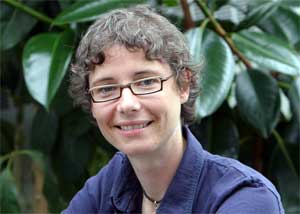 |
| Elaine Craig is one of 15 winners across Canada of a prestigious Trudeau scholarship. (Pearce photo) |
It├Ľs been 25 years since Queen Elizabeth II sat down to sign her name to the Canadian Charter of Rights and Freedoms as Canada├Ľs then-prime minister Pierre Elliott Trudeau stood and watched like an overprotective parent, with a smile on his face and a red rose in his lapel.
Since its adoption in 1982, the Charter has undoubtedly changed the legal landscape, but it├Ľs also created a discourse in this country about human rights that didn├Ľt┬áexist before.
├ĺIt├Ľs had a huge effect as far as Trudeau├Ľs legacy goes,ÔÇŁ says Elaine Craig, a ║┌┴¤│ď╣¤═°doctoral student. ├ĺIt├Ľs also had a huge effect on my life.ÔÇŁ
Prestigious scholarship
And now the Trudeau legacy has touched her in another way: she├Ľs one of 15 recipients across the country to win a prestigious Trudeau scholarship. Created in 2003, the Trudeau Foundation Scholarship program awards doctoral scholarships in the social sciences and humanities. The foundation annually awards up to 15 exceptional students $35,000 per year for three years, plus up to an additional $15,000 annually each to support research-related travel.
The scholarship will fund Ms. Craig├Ľs research, which will study human rights and why different cultures and religions have not, to date, found significant commonality in their interpretations of human rights principles.
Looking specifically at the Canadian experience through case studies, she├Ľll examine how the law accommodates the rights of minorities, and in particular how the law regards disempowered segments of society (for example, women) within specific minority groups.
The issue of distribution of rights within minority groups has received significant legal and media attention in Canada recently.┬áOne example includes the B.C. case of a transgender woman who sought to counsel rape victims but was ejected from a women├Ľs organization once they discovered she was not born as a biological woman. There have also been several notable cases in Quebec recently: a 11-year-old Muslim girl ejected from a soccer game for wearing a hijab; the central Quebec town of Herouxville adopting a declaration of ├ĺnormsÔÇŁ that tells immigrants how to fit in; and, a Montreal community centre banning men from prenatal classes so Muslim, Sikh and Hindu women can be accommodated.
Huge question
├ĺThis is one of those huge, unanswered theoretical questions: ├öHow does the law accommodate differences through the distribution of rights?├ĽÔÇŁ says Ms. Craig. The 32-year-old Alberta native graduated from ║┌┴¤│ď╣¤═°with a law degree in 2004. After articling in Toronto and completing her Master├Ľs law degree at Yale University, she returned to ║┌┴¤│ď╣¤═°a year ago to continue her studies, teach a required course in constitutional law and work with her supervisor, Dr. Ronalda Murphy.
Her first year as a teacher was capped off with a DSU Teaching Award. This fall, she├Ľll teach a seminar course in law and sexuality.
├ĺIssues of equality and justice definitely hit home for me,ÔÇŁ says Ms. Craig. ├ĺTo me, that├Ľs what the law is about. It├Ľs about figuring out a set of principals that we can all live by.ÔÇŁ
